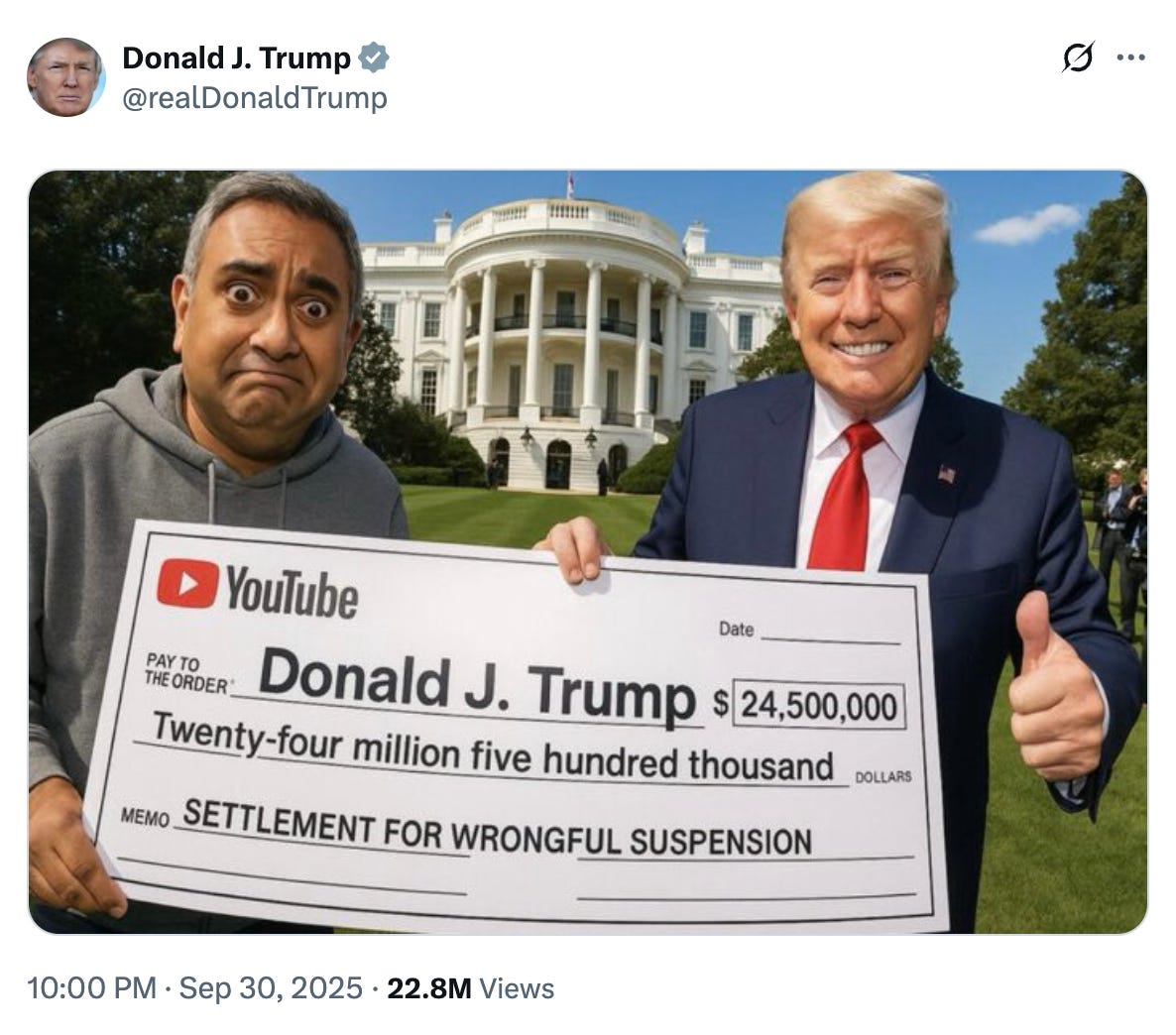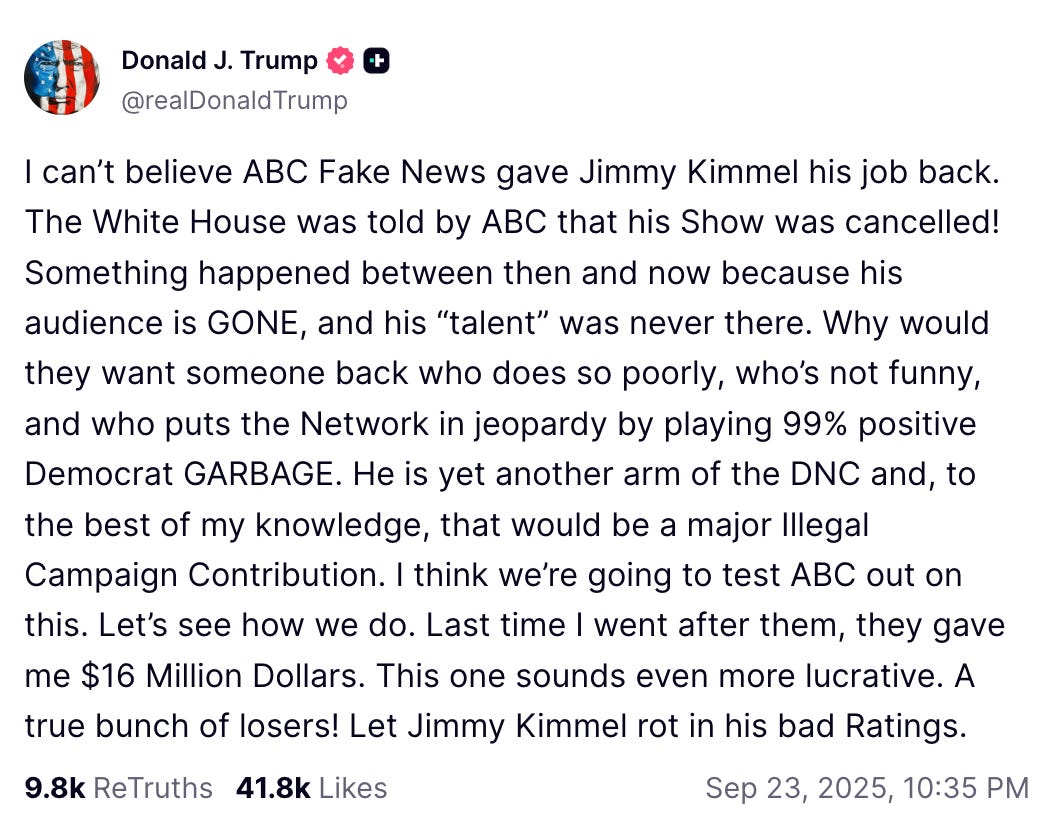Google joins presidential bribe club
It's a "settlement." WINK WINK.

PN is supported by paid subscribers. Become one ⬇️
On Monday, Google paid a $24.5 million bribe to President Trump.
The bag of cash was euphemistically described as a “legal settlement,” but in this dangerous political moment, we do ourselves no favors with polite obfuscation.
Google, like Paramount and Disney, decided that it was better to pay off Donald Trump than beat him in court. As an economic calculation, it makes sense — a few million dollars is a small price to pay to keep sweet with a despot using the levers of government to punish his enemies.
If they can arrest James Comey, they can definitely arrest Google CEO Sundar Pichai. But the rest of us now have to live in a country that is much closer to oligarchy, thanks in large part to the quiescence of the tech bros who fashion themselves as defenders of free speech.
Tech to Trump: GTFO
On January 7, 2021, after laying siege to Congress in an attempt to nullify an election, the sitting president was kicked off of every major social media platform.
Six months later, Trump held a press conference at Mar-a-Lago to announce that he was suing Twitter and Facebook — whose pronouns are now X and Meta — along with Google’s subsidiary YouTube. For good measure, he also named CEOs Jack Dorsey, Mark Zuckerberg, and Sundar Pichai as defendants.
Trump whined that the platforms had violated the First Amendment by removing him six months earlier. Only the government can violate the First Amendment, of course, but Trump’s sparklemagic lawyers had a solution for that problem. What if the social media platforms actually became government agents because the government threatened them with retribution if they didn’t boot Trump and his pals? Sure, Donald Trump was the head of government when he got deplatformed, and there’s no evidence of any such threats. But Trump and his lawyers forged ahead anyway.
Their theory centered on Section 230 of the Communications Decency Act, which shields websites from liability for user-generated content and allows them to moderate as they see fit. Trump’s lawyers simultaneously argued that Section 230 is illegal and must be invalidated, and that Democratic legislators had conscripted the platforms as government agents by threatening to invalidate the law if the platforms didn’t fall in line.
That claim required more than a little chutzpah. Just three weeks before getting kicked offline, Trump himself vetoed the 2020 defense bill because Congress refused to include a repeal of Section 230. And in fact the biggest supporters of Section 230 repeal were Republican Sens. Josh Hawley and Ted Cruz.
The lawsuits were also inchoate nonsense. As proof of the pressure campaign, Trump pointed to a tweet by Michelle Obama on January 7, 2021 suggesting that Silicon Valley companies should “stop enabling this monstrous behavior and go even further than they have already by permanently banning this man from their platforms.” He cited Mark Zuckerberg’s congressional testimony in November 2020 that “incitement of violence is against our policy and there are not exceptions to that, including for politicians.” He quoted Sen. Richard Blumenthal in October 2020 advocating for “Section 230 reform, meaningful reform, including even possible repeal in large part because their immunity is way too broad and victims of their harms deserve a day in court.”
None of the supposed evidence contained a threat to repeal Section 230 if Trump was not deplatformed. The closest was a tweet by then-Rep. Adam Schiff saying “there’s no Constitutional protection for using social media to incite an insurrection. Trump is willing to do anything for himself no matter the danger to our country. His big lies have cost America dearly. And until he stops, YouTube must ban him. Which is to say, forever.” But that came in May 2021, five months after YouTube had already kicked Trump offline.
In short, the lawsuits were hot garbage, and in May 2022 Judge James Donato dropkicked the suit against Twitter for being defective in every way. Trump appealed to the Ninth Circuit, after which Judge Jeffrey White put the YouTube and Facebook cases on ice. If by some miracle Trump prevailed in his Twitter appeal, Judge White could simply copy the Ninth Circuit’s work. If the Ninth Circuit upheld the trial court’s ruling, he could write “I agree with Judge Donato!” and be done with it.
But then Twitter decided that it would prefer to lose the case it had already won.
Floppers flip
Two weeks after Trump’s election victory last year, the parties informed the court that they were in settlement talks. In February of this year, with X’s new owner ensconced at the White House, Twitter paid Trump $10 million to “settle” the case.
That revived the other two tech trollsuits. But as it turned out, Mark Zuckerberg and Sundar Pichai decided that they’d also prefer to lose! This is perhaps unsurprising, since Zuckerberg, Pichai, and Musk were all at the White House for Trump’s inauguration, along with Jeff Bezos, Tim Cook, Rupert Murdoch, TikTok CEO Shou Chew, and Open AI’s Sam Altman. Just nine days after Trump was sworn in, Facebook announced that it was “settling” its suit for $25 million.
That left only Google, which took a little longer than the others to negotiate a bribe. According to Wall Street Journal reporters Rebecca Ballhaus and Annie Linskey, that’s because “Google executives were eager to keep their settlement smaller than the one paid by rival Meta.” Apparently, Pichai didn’t mind prostrating himself before the dictator as long as Zuckerberg’s nose was just a little closer to the ground. The Journal also noted that “the settlement comes as Google is under pressure from the Justice Department to break up its ad businesses after a federal judge ruled this spring that the company had created a monopoly in advertising.”
Adding insult to injury, $22 million of the payoff will go to the Trust for the National Mall, with the direction that it be spent to build the 90,000 square foot monstrosity Trump plans to construct in the White House’s East Wing. The “ballroom” will dwarf the main White House building, which is only 55,000 square feet.
CBS reports that Trump is energetically shaking down companies with business before his administration and has already raised $200 million to deface the seat of government with a replica of his Florida country club.
Garbage in, garbage out
John Coale, the Florida insurance lawyer (and husband to Greta van Susteren) who spearheaded the tech suits, couldn’t even be bothered to pretend this was a legal victory.
“If he had not been re-elected, we would have been in court for 1,000 years,” he babbled to the Journal. “It was his re-election that made the difference.”
As if to underscore that, the same day Google’s “settlement” dropped, a court in New York demolished its legal premise in a case brought by Alex Berenson.
Berenson, a business reporter turned spy novelist, achieved some celebrity in 2020 as vehement covid denier. Famously branded The Pandemic’s Wrongest Man by The Atlantic’s Derek Thompson, Berenson was one of the prodigious purveyors of misinformation flagged by the White House in 2021. In August of that year, he was booted off Twitter, after which he sued the platform on the theory that it was functioning as an agent of the government to suppress his First Amendment rights. (Sound familiar?)
A federal judge in California rubbished Berenson’s theory, noting that “general cajoling from various federal officials regarding misinformation on social media platforms do not plausibly assert Twitter conspired or was otherwise a willful participant in government action.” But individual managers at Twitter had allegedly assured Berenson that he wouldn’t be kicked off, so the court allowed a secondary breach of contract claim to proceed. Eventually Twitter restored Berenson’s account, and he dropped the case.
Berenson went on to file a different lawsuit against the Biden administration, on the theory that it violated the First Amendment by getting him kicked off Twitter years before. That’s the same argument — if rotated 90 degrees — that Trump made in his own trollsuits against the tech platforms. But Berenson can’t wield a weaponized federal government as a cudgel against his opponents, so his suit got unceremoniously bounced out of court for failure to state a cognizable legal claim. While Trump was cashing that $24.5 million check, Berenson was arguing about Tylenol on what remains of Twitter and trying desperately to #MeToo himself back to prominence by clinging to Jimmy Kimmel’s coat tails.
Trump’s trollsuits failed in court, but succeeded as a means of extorting his enemies. But the tech titans would do well to remember that giving the bully your lunch money isn’t something you do just once.
Trump is already threatening to sue Disney again after it dared to defy him and put Kimmel back on the air. Pichai should keep his checkbook handy — and prepare to stick his nose even lower than Zuck’s.
That’s it for today
We’ll be back with more tomorrow. If you appreciate today’s PN, please do your part to keep us free by signing up for a paid subscription.
Thanks for reading, and for your support.







This isn’t just a bribe. It’s behavioral theater…and the tech titans are playing their assigned roles.
Google didn’t settle. It submitted. Paramount and Disney didn’t negotiate. They capitulated. Because in a system where legal process is just a mask for coercion, the only rational move is to pay the bully and hope he doesn’t come back tomorrow.
I unpacked this exact dynamic in my latest piece: The Collapse of Moral Authority, Part II. When cruelty becomes currency and spectacle replaces law, the “settlement” isn’t a legal outcome, it’s a loyalty test.
And the U.S. legal system? It’s not malfunctioning. It’s performing exactly as designed.
Read the piece. Then ask yourself: who’s next in line to pay tribute?
Thank you for writing this!
It is like a homeowner pouring gasoline on a house fire. Paying a "settlement" for current legal issues thinking that a pay-off will be enough to forestall future legal actions? All prior Trump experiences going back decades would indicate this is delusional. Let's follow that Trump money trail. Where does it end up? The US Treasury or Trump coffers?